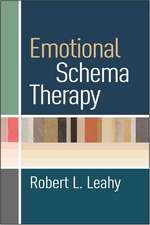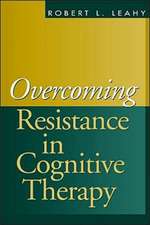Roadblocks in Cognitive-Behavioral Therapy: Transforming Challenges into Opportunities for Change
Editat de Robert L. Leahyen Limba Engleză Paperback – 4 sep 2006
Why do standard, evidence-based interventions fail to work for certain clients or in certain situations? What tools do cognitive-behavioral theory and therapy offer for managing difficult cases? This cutting-edge volume brings together an array of leading practitioners to address these and other critical questions that are often overlooked in the CBT literature. Each research-based chapter addresses a specific kind of roadblock, exploring how and why it arises and suggesting effective, practical solutions. Topics include overcoming obstacles in the treatment of specific disorders, new directions in case conceptualization, working with emotional and metacognitive processes, and applications to couple and family therapy.
Preț: 315.53 lei
Preț vechi: 332.14 lei
-5% Nou
Puncte Express: 473
Preț estimativ în valută:
60.38€ • 63.04$ • 49.97£
60.38€ • 63.04$ • 49.97£
Carte tipărită la comandă
Livrare economică 05-19 aprilie
Preluare comenzi: 021 569.72.76
Specificații
ISBN-13: 9781593853730
ISBN-10: 1593853734
Pagini: 364
Ilustrații: black & white illustrations
Dimensiuni: 152 x 229 x 25 mm
Greutate: 0.6 kg
Ediția:1
Editura: Guilford Publications
Colecția Guilford Press
ISBN-10: 1593853734
Pagini: 364
Ilustrații: black & white illustrations
Dimensiuni: 152 x 229 x 25 mm
Greutate: 0.6 kg
Ediția:1
Editura: Guilford Publications
Colecția Guilford Press
Public țintă
Postgraduate, Professional, and Professional Practice & DevelopmentCuprins
I. Case Conceptualization
1. Case Conceptualization in Preventing and Responding to Therapeutic Difficulties, Lawrence D. Needleman
2. Impediments to Effective Psychotherapy, Arthur Freeman and Roya Djalali McCloskey
3. Effective Homework, Michael A. Tompkins
II. Metacognition and Emotion
4. Anxiety Disorders, Metacognition, and Change, Adrian Wells
5. Emotional Schemas and Resistance, Robert L. Leahy
6. Avoidance of Emotion as an Obstacle to Progress, Stephen J. Holland
III. Specific Populations
7. Psychosis, Gillian Haddock and Ronald Siddle
8. Bipolar Disorder, Cory F. Newman
9. Posttraumatic Stress Disorder: A New Algorithm Treatment Model, Mervin R. Smucker, Brad K. Grunert, and Jo M. Weis
10. Binge-Eating and Other Eating Disorders, Nicole A. Schaffer
IV. Couples and Families
11. Couple Therapy, Norman B. Epstein and Donald H. Baucom
12. Family Therapy, Frank M. Dattilio
V. Psychotherapy Processes
13. Difficult-to-Treat Patients: The Approach from Dialectical Behavior Therapy, Christine Foertsch, Sharon Y. Manning, and Linda Dimeff
14. Obstacles or Opportunities?: A Relational Approach to Negotiating Alliance Ruptures, Christopher L. Stevens, J. Christopher Muran, and Jeremy D. Safran
15. Angry Patients: Strategies for Beginning Treatment, Raymond Chip Tafrate and Howard Kassinove
16. Medication Compliance with Difficult Patients, Lynn Marcinko
17. Conclusions, Robert L. Leahy
1. Case Conceptualization in Preventing and Responding to Therapeutic Difficulties, Lawrence D. Needleman
2. Impediments to Effective Psychotherapy, Arthur Freeman and Roya Djalali McCloskey
3. Effective Homework, Michael A. Tompkins
II. Metacognition and Emotion
4. Anxiety Disorders, Metacognition, and Change, Adrian Wells
5. Emotional Schemas and Resistance, Robert L. Leahy
6. Avoidance of Emotion as an Obstacle to Progress, Stephen J. Holland
III. Specific Populations
7. Psychosis, Gillian Haddock and Ronald Siddle
8. Bipolar Disorder, Cory F. Newman
9. Posttraumatic Stress Disorder: A New Algorithm Treatment Model, Mervin R. Smucker, Brad K. Grunert, and Jo M. Weis
10. Binge-Eating and Other Eating Disorders, Nicole A. Schaffer
IV. Couples and Families
11. Couple Therapy, Norman B. Epstein and Donald H. Baucom
12. Family Therapy, Frank M. Dattilio
V. Psychotherapy Processes
13. Difficult-to-Treat Patients: The Approach from Dialectical Behavior Therapy, Christine Foertsch, Sharon Y. Manning, and Linda Dimeff
14. Obstacles or Opportunities?: A Relational Approach to Negotiating Alliance Ruptures, Christopher L. Stevens, J. Christopher Muran, and Jeremy D. Safran
15. Angry Patients: Strategies for Beginning Treatment, Raymond Chip Tafrate and Howard Kassinove
16. Medication Compliance with Difficult Patients, Lynn Marcinko
17. Conclusions, Robert L. Leahy
Notă biografică
Robert L. Leahy, PhD, is Director of the American Institute for Cognitive Therapy in New York City and Clinical Professor of Psychology in the Department of Psychiatry at Weill Cornell Medical College. Dr. Leahy is Associate Editor of the International Journal of Cognitive Therapy and is past president of the Association for Behavioral and Cognitive Therapies (ABCT), the International Association for Cognitive Psychotherapy, and the Academy of Cognitive and Behavioral Therapies (A-CBT). He is a recipient of the Outstanding Clinician Award from ABCT and the Aaron T. Beck Award from A-CBT. Dr. Leahy is author or editor of 29 books for mental health professionals and the general public, including If Onlyand The Worry Cure. His books have been translated into 21 languages.
Recenzii
Dr. Robert L. Leahy has brought together leading cognitive-behavioral therapists from around the world to provide a rich compendium of tools and techniques that deals with roadblocks in treatment. He sees resistance as a window into the patient's psyche that needs to be addressed with a collaborative ear. Each chapter addresses specific issues suggesting practical solutions which provide an abundance of specific strategies that can be used by both beginning and seasoned therapists alike.--Muriel Prince Warren, DSW, ACSW
Roadblocks in Cognitive-Behavioral Therapy provides a rich and multifaceted exploration of the many obstacles that can arise in the treatment process. It does a marvelous job of explaining why and how roadblocks occur in therapy with diverse individuals, as well as couples and families, and provides a coherent set of principles for turning obstacles into what Leahy calls windows of opportunity. Filled with clinical wisdom and specific strategies, this volume should be of use to both beginning and experienced clinicians. It could well become a mainstay of professional training programs at all levels.--Steven D. Hollon, Department of Psychology, Vanderbilt University
Leahy, one of cognitive therapy's most prolific and creative writers, has brought together leading therapists in the field to address the important issue of impasses and disruptions in therapeutic progress. With coverage of such areas as case conceptualization, the relationship of cognition to emotion, and the therapeutic relationship, the volume provides a wealth of insights and practical solutions to clinical difficulties. I highly recommend this book and I am sure that, like me, others readers will learn much from it.--Paul Gilbert, FBPsS, Mental Health Research Unit, Kingsway Hospital, Derby, UK
This book will suffer a lot of abuse from being pulled from your office shelf again and again to be pored over for ideas and inspiration. Leahy has pulled together some of the greatest CBT minds to share their thoughts, feelings, and strategies for working with some of our most difficult-to-treat disorders and populations. Whether a neophyte or a veteran therapist, the reader will find new ways to understand obstacles and overcome resistance in its many guises.--Peter J. Bieling, PhD, St. Joseph's Hospital, Hamilton, Ontario, Canada; Department of Psychiatry and Behavioral Neurosciences, McMaster University
-Roadblocks in Cognitive-Behavioral Therapy provides a rich and multifaceted exploration of the many obstacles that can arise in the treatment process. It does a marvelous job of explaining why and how roadblocks occur in therapy with diverse individuals, as well as couples and families, and provides a coherent set of principles for turning obstacles into what Leahy calls windows of opportunity. Filled with clinical wisdom and specific strategies, this volume should be of use to both beginning and experienced clinicians. It could well become a mainstay of professional training programs at all levels.--Steven D. Hollon, Department of Psychology, Vanderbilt University
Leahy, one of cognitive therapy's most prolific and creative writers, has brought together leading therapists in the field to address the important issue of impasses and disruptions in therapeutic progress. With coverage of such areas as case conceptualization, the relationship of cognition to emotion, and the therapeutic relationship, the volume provides a wealth of insights and practical solutions to clinical difficulties. I highly recommend this book and I am sure that, like me, others readers will learn much from it.--Paul Gilbert, FBPsS, Mental Health Research Unit, Kingsway Hospital, Derby, UK
This book will suffer a lot of abuse from being pulled from your office shelf again and again to be pored over for ideas and inspiration. Leahy has pulled together some of the greatest CBT minds to share their thoughts, feelings, and strategies for working with some of our most difficult-to-treat disorders and populations. Whether a neophyte or a veteran therapist, the reader will find new ways to understand obstacles and overcome resistance in its many guises.--Peter J. Bieling, PhD, St. Joseph's Hospital, Hamilton, Ontario, Canada; Department of Psychiatry and Behavioral Neurosciences, McMaster University
Leahy has packed this volume with clinical wisdom and insightful practical advice....The table of contents reads like a full course gourmet meal.
--Bulletin of the Menninger Clinic, 7/23/2006ƒƒ[This book] addresses concerns and challenges that are common to all clinical approaches. Its emphasis on clinical application and overcoming treatment challenges coupled with its easy readability make it a useful addition to the clinical libraries of established clinicians and trainees alike.
--Psychotherapy, 7/23/2006Descriere
Why do standard, evidence-based interventions fail to work for certain clients or in certain situations? What tools do cognitive-behavioral theory and therapy offer for managing difficult cases? This cutting-edge volume brings together an array of leading practitioners to address these and other critical questions that are often overlooked in the CBT literature. Each research-based chapter addresses a specific kind of ""roadblock,"" exploring how and why it arises and suggesting effective, practical solutions. Topics include overcoming obstacles in the treatment of specific disorders, new directions in case conceptualization, working with emotional and metacognitive processes, and applications to couple and family therapy.










